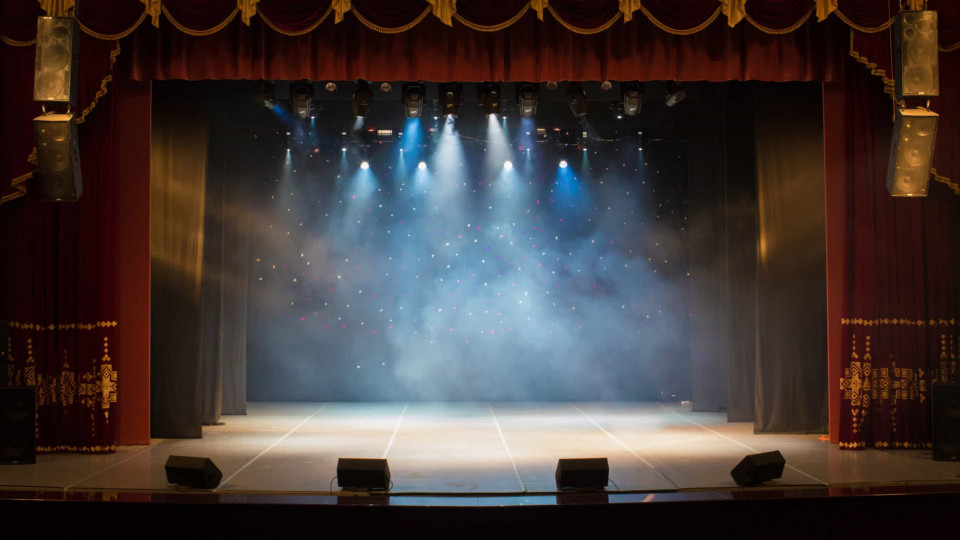'Irmã Palestina' show brings together Teatro O Bando and Companhia Olga Roriz
The show 'Irmã Palestina' debuts on Saturday at the Coliseu do Porto and brings together Teatro O Bando and Companhia Olga Roriz for the second of four shows around the 1001 Nights, with Palestinian ballerina Maria Dally in the cast.

© Shutterstock

Cultura Palco
At 9 pm on Saturday, the show directed by João Brites and Olga Roriz, who reunited many years later crossing theater, dance and music, follows 'Irmã Persa', in 2023, and also has the partnership of the Banda Sinfónica Portuguesa, inserted in the programming of the International Festival of Iberian Expression Theater (FITEI).
Integrated into the celebrations of the 50th anniversary of Teatro O Bando, 'Irmã Palestina' puts on stage King Xariar, with Xerazade, here played by Rita Brito, and her sister, Dinarzade, this time by the Palestinian Maria Dally.
The text, translated by Hugo Maia, the light design by Rui Monteiro, and the music involve the spectator around the cast, complete with António Bollano, Fabian Bravo, Maria Fonseca, Marta Lobato Faria, Nicolas Brites and Yonel Serrano.
"The fact that it is called 'Irmã Palestina' increases our responsibility. Maybe people expect a very literal show and close to what is happening today. It is a show about war, violence, the inability to talk to each other, about power. That said, it is absolutely poetic", explains João Brites to Lusa.
For the artistic director, in this show there was a combination of "a pair of people who take advantage of each other", in a good way, between the work in collaboration with Olga Roriz, "very special", to the combination of factors in which "the work, the theater and the dance, are more than can be explained".
"We don't do theater to expose ideas, we do theater to better understand the ideas we have. (...) We build a concrete utopia in the present, not distant. Something that seems like a chimera, and we work together not so much to question ourselves, but to realize that the Other brings things", he adds.
In this "text of very ancient oral tradition", which serves almost as "a code of conduct for relations between human beings", says João Brites, there is a mechanism of "history within history within history", completes Olga Roriz.
"There is the story of Xerazade and Dinarzade, and within that the story of the merchant and the genius, which will branch out into two others, the three ladies and the three apples. (...) This beautiful repetition seduced me immensely, by the stylistic side, of literature, and because they are ancestral stories, almost the stronghold of Humanity", she explains.
For the choreographer, the combination of ideas with João Brites was a "very challenging" proposal, to cross "very different methods and work processes", but which came together, over the course of artistic residencies that took place in the last two years, and of a group union that made it difficult, in the final part, to distinguish the dancers from the actors.
"It also has a lot to do with the cast. As we prepared them for this duplicity, which was to make the dancers think more about the word and the actors more about the body, we began to have a group union in which we looked and no longer realized who was who", she reveals.
Without "feeling that there was room for choreographies, in the sense of dances", it was up to her to work these characters from "the changes of each one, the movement throughout the piece", with a work in which both directors were guiding the cast, and the interest in the work makes her think of, "in about two years, taking up the 1001 Nights".
On the table, a dialogue of languages, with both creators exalting the cast, the light work and the Banda Sinfónica Portuguesa, but also of languages, since Maria Dally says her lines in Arabic-Palestinian, without subtitles, with the rest of the show spoken in Portuguese.
In an interview with Lusa, Maria Dally describes the "fantastic and very interesting" experience of reaching an understanding without understanding the other's language.
"It's a message to the audience, about how we are similar peoples, even if we live in different territories, and we understand each other, we share feelings, moments, a way of thinking", she added.
This meeting is so evident "in everyday life as in these old stories", and we can experience "beauty, injustice, violence", and on stage these concepts will be present "but also the way in which we decide to deal with it, with history".
"In these critical times, such as the ones my people are going through, it is very sensitive. The audience will always see me as a Palestinian. It will be difficult to separate that. (...) I bring something different, but in this difference I can find what is common, what is shared", she recalls.
After FITEI, 'Irmã Palestina' will be at the Teatro Municipal São Luiz, in Lisbon, from May 30th to June 2nd, and from June 7th to 16th at the Cine-teatro São João, in Palmela, in the district of Setúbal, then continuing on July 6th, to the Almada Theater Festival.
The 47th edition of FITEI runs until May 26th and goes through 14 different stages in Porto, Vila Nova de Gaia, Matosinhos and Viana do Castelo, with nine international shows and several national premieres on display, in a year under the theme 'Trauma, Bravura and Phantasmagorias'.
Leia Também: Teatro do Imigrante estreia-se hoje em Lisboa com 'Na boca do tubarão' (Portuguese version)

Descarregue a nossa App gratuita.
Oitavo ano consecutivo Escolha do Consumidor para Imprensa Online e eleito o produto do ano 2024.
* Estudo da e Netsonda, nov. e dez. 2023 produtodoano- pt.com



